Wednesday Feb 18, 2026
Wednesday Feb 18, 2026
Wednesday, 14 October 2020 01:23 - - {{hitsCtrl.values.hits}}
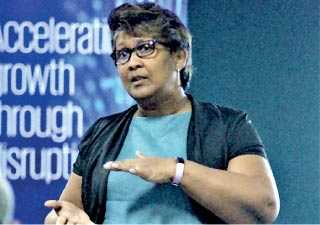
John Keells and JL Morrisons Non-Executive Director and SheConsults Founder/Director Aruni Rajakarier
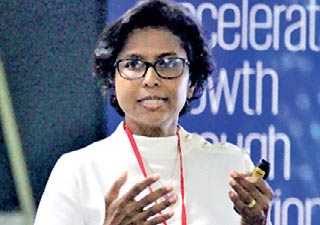
MAS Holdings Director – Group Risk and Control Natalie Warawita
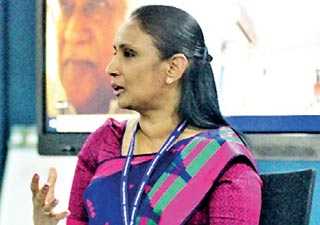
KPMG in Sri Lanka Partner Ranjani Joseph

Panel discussion
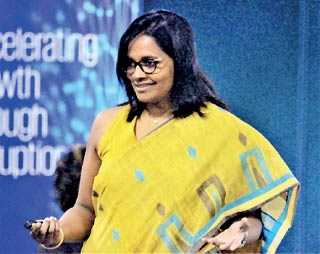 |
| KPMG in Sri Lanka Partner Thamali |
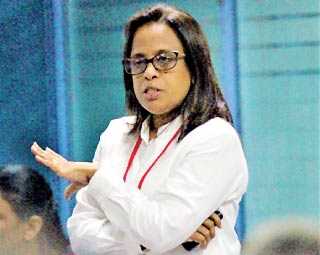 |
| DFCC Bank and United Motors Lanka Non-Executive Director and R I L PropertyCEO Hiroshini Fernando |
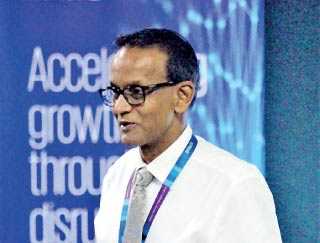 |
| KPMG in Sri Lanka Partner Suren Rajakarier |
As we look back at the passage of time, the period of turmoil that began in late March due to COVID-19 had steered towards recovery after six months until just last week. Sri Lanka is again affected by this new wave of COVID-19, with number of cases increasing rapidly. As uncertainty has become a consistent factor of 2020, Audit Committees may need to widen their scope to address the challenges that arise during such unprecedented times.
The 22nd Audit Committee Forum was hosted by KPMG on 6 October, under the theme ‘Implications for Audit Committees arising from COVID-19’. The session was a follow up to the session in May and consisted of four presentations and concluded with a panel discussion.
KPMG in Sri Lanka Partner Thamali Rodrigo started the session with her presentation on ‘Emerging Focus Areas for External Audit,’ followed by a presentation on ‘Core responsibilities with emerging priorities and how to balance them’ by DFCC Bank PLC and United Motors Lanka PLC Non-Executive Director and R I L Property PLC CEO Hiroshini Fernando.
MAS Holdings Director – Group Risk and Control Natalie Warawita provided valuable insight on ‘Oversight through Virtual Communication’. The final presentation was made by John Keells PLC and JL Morrisons Non-Executive Director and SheConsults Ltd. Founder/Director Aruni Rajakarier on ‘Broader Reporting and Communication Aspects’.
The rapidly changing risk landscape has increased the need for relevant and reliable information. While referring to the increased uncertainty caused by the heightened difficulty in financial estimations, judgements and reporting, including going concern assessments, the following takeaways were noted in the first session:
nThe BAC should examine and vigorously challenge financial estimates in areas such as fair value estimations and going concern justifications, and seek expert assistance when it lacks it, so the integrity of financial reports to stakeholders is maintained.
nIt should increase the frequency and substance of contact with the external auditors, to better understand their concerns and benefit from their insights. This discussion could also cover the scope of disclosures required to make financial reports most meaningful.
nHave a process to identify early signs of financial stress, going concern considerations, and other financial reporting implications, such as accounting estimates and events after the reporting period to ensure they’re accurately disclosed.
Audit committees are having to be vigilant on an expanding range of issues despite their fundamental responsibilities in respect to the oversight of financial reporting and internal controls. While emphasising on the changed business practices induced by the pandemic (including WFH and increased digital commerce) have serious implications for internal control and fraud risk, balancing their core responsibilities with such emerging priorities was discussed in the next session with the following key takeaways:
nBAC should pay attention to third-party risk management, scenario planning/business plans, impact of specific legislation, and comprehensive business continuity thinking that may have a financial reporting impact.
nInternal audit has to position itself closer to the business, and become agile and tech- enabled (via IT and analytics), to better meet the challenges that arise.
nFraud risk is heightened by “opportunities” in the wake of changed business practices and by greater pressure on people due to personal circumstances. Unrealistic performance targets which are insensitive to the drastically changed environment can add to the pressure for fraud.
Another focus area of the session was to improve how BACs are adapting their way of working to function and fulfil their responsibilities without meeting physically. It was reiterated that the BAC must recognise and address its responsibility to monitor the management of risk and following were some key observations:
nThe BAC is required to provide oversight on the process of governance, risk and controls in the organisation and not simply focus on financial reporting aspects only.
nAn area of risk that is likely to require external expert help is that of cyber risk.
nThe BAC must bring itself closer to the scene, with (more) frequent communication (virtual or otherwise) with internal audit, the CEO and CFO, and other members of management.
nCombined assurance (three lines of defence working together) will be helpful to mitigate risks from this volatile and uncertain situation. It’s a culture of each level performing their roles effectively supported by a rigorous process for monitoring with BAC oversight.
To enhance trust and transparency, the audit committee can play a crucial role in respect to broader corporate reporting, overseeing a wider set of business and reporting risks. This key aspects highlighted in the final session were:
• ACs have a role in ensuring businesses understand and communicate their value propositions to different stakeholders, balancing profit with purpose, and thinking about how the business has, or can have, a social impact and create and preserve value for wider stakeholders.
nIn the wake of the current crisis, investors are also increasingly asking for more forward-looking information and disclosures which can be provided by ESG reporting. Examples of having a process to track non-financial capitals like manufactured, intellectual, human, natural, social and relationship include; registers for fixed assets, licenses, complaints, human resources, etc.
nMany organisations overseas report broader information through mandatory and voluntary narrative reporting. But there is a lot of room for improvement in Sri Lanka.
The presentations were followed by a panel discussion moderated by KPMG in Sri Lanka Partner Ranjani Joseph. The discussions helped shed light and clarify practical issues faced by BAC members in fulfilling their responsibilities. The important role played by the external auditors in helping the BAC to identify risks and mitigate them and the importance of non-financial information and other narrative reporting in annual reports and the crucial role BAC should play were also highlighted during the discussions.
In concluding the session, KPMG in Sri Lanka Partner Suren Rajakarier who coordinates the activities of the Forum stressed on the key role the BAC plays in creating and maintaining a culture and environment that supports the integrity and timely presentation of useful information about an organisation to its stakeholders and was hopeful that such discussions will uplift the standard of BAC oversight.
The Audit Committee Forum provides much insight for members of audit committees on how to address the emerging challenges with the ever changing risk environment. The Forum which operates under the aegis of the Sri Lanka Institute of Directors (SLID) has been supported and enabled since inception by KPMG in Sri Lanka, in line with its globally recognised Audit Committee Institute initiative.
KPMG’s Audit Committee Institute provides audit committee members with practical insights, resources, and peer exchange opportunities focused on strengthening oversight of financial reporting, risk management and audit quality.